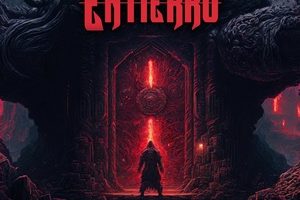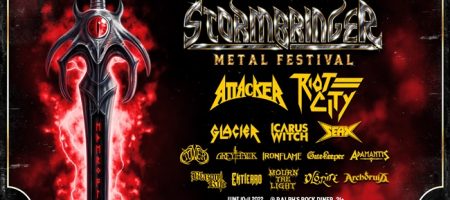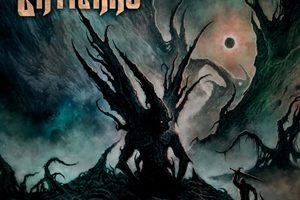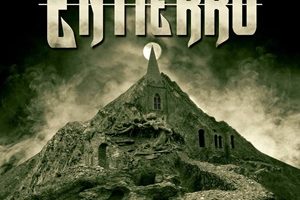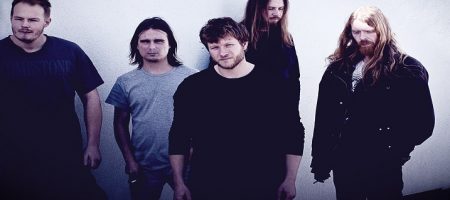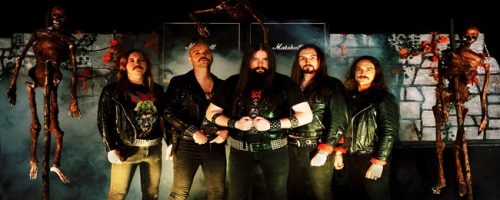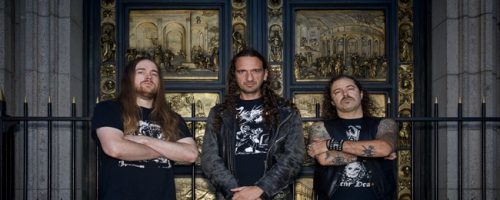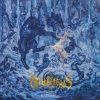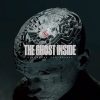Entierro – Authentic and Classic
Thursday, 29th July 2021
Driven by the desire to play traditional, old school classic heavy metal that these gentlemen grew up on, Entierro has steadily made inroads in the current scene through their discography. Their latest EP El Camazotz contains four original songs plus a Judas Priest cover from their 70’s back catalog, injecting their sound with twin guitars, solid vocal hooks/melodies, and the spirit of fist pumping, headbanging songs that make you feel the energy and aggression of those 80’s heydays – given a little doom, thrash, and extreme nuances to broaden the influence bank.
We reached out to the full band on Zoom one weekday evening and they were all happy to bring us up to speed on the latest EP, recording at Wormwood Studios, thoughts regarding Judas Priest, favorite musical memories, and how things may look different coming out of this pandemic for bands. Get up to speed with vocalist/bassist Christopher Taylor Beaudette, guitarists Victor Arduini and Chris Begnal, and drummer Dave Parmalee.
Dead Rhetoric: The latest release for Entierro is El Camazotz, a five-song EP follow up to your 2018 full-length. Outside of Victor Arduini’s full involvement in the band, especially on the composition front – where do you see the major differences in this release compared to the debut?
Victor Arduini: I would say, if I may, when I joined the band they were definitely more of a doom influenced band, with some thrash influences. Definitely not where we are now, let’s put it that way. And then we did our first full-length together. And we were still that band that was doomy, but you saw songs showing they were more of the old school heavy metal style that we were touching on it. It was still a lot of heavier riffs, slower stuff – but we weren’t sitting in there in the room saying it was the direction we were going in. Naturally with Chris here, the other guitarist, his other riffs were naturally gravitating to old, traditional metal. He wrote the song “Controlled Burn”, which is definitely the one that fits best with what we are doing now.
After we wrote that album, we just continued in that vein. It is my natural influences, and Chris liked going into that style. The album, we touch on it, when we went to go to do this new EP and with the new material, I started coming down with stuff that we embraced, this old school heavy metal style. We have two guitar players, we can twin up good, and you have to have two people that can play together well. I think we do a good job with that.
Chris Begnal: Another reason that pointed us in this direction, Vic and I were working so well as a guitar team rather than just two guitar players working in a band. In terms of harmony, things like that, it stems from Mercyful Fate, Iron Maiden, things like that. It lent itself towards that sound – as a lot of doomier guitar bands have a single guitar player. Being more of a team led us more of a traditional sound.
Chris Taylor Beaudette: Before Victor came in, there were little flashes of traditional heavy metal. There are other influences that came in, but Victor was key in helping us add more of a Judas Priest-type of element, the twin guitar attack. Having someone who was organically able to write and play that call to the past, real traditional roots, we were able to explore that in earnest because Vic was the go ahead to this. Let’s bring the tempos up, leave some of the doom parts, and went from there.
Dead Rhetoric: You chose to work with Dave Kaminsky at Studio Wormwood in Northeastern Connecticut – what do you think his studio and his skill sets brought to the table to help Entierro get the sound you wanted this time around?
Beaudette: Nick Bellmore at Dexter’s Lab Studios, where we previously had done the full-length, I’ve known him for years. He’s an excellent, modern metal engineer and producer. For this one, because we had such a marked change in sound, we wanted a change in the recording quality. Dave was willing to work in a way that was a little more atmospheric instead of necessarily trying to get the best sounding sonic take. We tried to evoke a more vintage sound. At least for me, let’s see if we can track this where we all tried to play together live, which is not exactly the norm in this multi-tracking, cut and paste world. We tried to get all the rhythms down live together as a band, and with that tried to keep the drums not necessarily less up front, but stay away from pushing things to the max that tends to dominate a lot of modern metal. We wanted to harken back to say Black Sabbath where Bill Ward’s drums were clearly audible, but not in such a forefront where the guitar play can take some extra space.
Arduini: Not that Nick couldn’t have done that, but we all know his style and what we love about it. We didn’t want to sound like our last album, and a lot of what he does has a certain flair. He has done Dee Snider albums – we wanted things to be a little more rough around the edges. Sound like a band that’s really playing. And Dave got that out of us, he has a very comfortable studio. We did some of the basic tracks standing right next to Dave. That really helped us look at each other in the room. The last album I had all the demos and click tracks done, played to those. It was a whole change of what we are doing. We wanted to go with a producer who could give us a warmer sound.
Dead Rhetoric: Were there any specific songs that were more of a challenge to record, or maybe changed a little bit from the songwriting process to the final recording?
Arduini: I wouldn’t say anything changed. We knew what we were doing. What ended up happening for the solos with Chris and myself, those became more organic. We worked out the harmonies together after the basic tracks were done. We had the basic structures of all the songs there. Even the intros to “The Tower”, that was pre-written with harmonies. We like to demo things, I like to have an idea of what we are going into before hitting the studio.
Beaudette: When it comes to the vocals, we let them go until very close to the end of the process. I want things to sit for a while, the music is a little complex in certain parts. I want to make sure these guys have down what they want to do in terms of sonically, they are getting what they want and I can adapt what I’m going to do for the vocals for the final product. Thank God these guys have excellent ideas, it was nice to let them go and do their thing.
Dead Rhetoric: Beyond the four original tracks, you end the EP with a Judas Priest track from the Sin After Sin album “Call for the Priest”. What made this the ideal song to pay tribute to the band – and discuss what the work of this band has meant to you guys as musicians, performers, and songwriters?
Beaudette: My entire left arm is dedicated to Judas Priest – I can certainly say I pushed for a Judas Priest cover and we pushed stuff around for well over a year.
Arduini: It’s been a staple in our set as we have been playing that live for over a year. We wanted a little nod to the old school.
Beaudette: And we were also conscious of the fact that we weren’t going to cover “Living After Midnight”. We wanted to go a little deeper with that. At least that record (Sin After Sin) is a well- respected record because that was their first major label release, a lot of tunes that became staples of their live set, and a lot of really interesting, developmental songs for Priest at that time. They really went for the heavy metal sound, we looked for a great song with energy, and something we could take off with and put some interesting stuff to with the guitar parts. I think they have only played it live a few times, so we could take it and make it our own. Sometimes when a band plays a song live, it can water it down based on the studio version. It’s a fresh start for us.
Begnal: I am glad we waited to record it, we owned the song by that point. There are no overdubs as far as the music – we played it in one take.
Beaudette: We played the record live, used live amplifiers, and we had a problem. It sounds slightly different from the record because of that. Crossed our fingers, we went for it and I am happy how it came out.
Arduini: I love the harmonies that Chris and I hit in that. You can’t get much better than that. Priest rules.
Begnal: Historically speaking, we used to do “Dissident Aggressor” as well. Sin After Sin is an album closer to our heart, then Turbo anyway (laughs).
Dead Rhetoric: Given the work that many of the members do (and have done) in other bands within other genres of the metal/heavy rock/hardcore scene, what makes Entierro intriguing and special to you as musicians?
Beaudette: I absolutely love the fact that everyone in this band is completely united in traditional, classic heavy metal. Everyone has their own individual takes they bring into this, I bring in a love for thrash, a little more of the harder breakdown parts, NYHC and punk sensibility. Vic has the traditional metal side from Fates Warning, a little prog side as well.
Begnal: Traditional metal is where I started in 1984, and then I had to make a living, so I spent 25 years playing funk, bar music, covers. When I finally had the opportunity to go back and play original music again, it just made sense to go back to my roots. I never wrote music in those other genres, because at the end of the night I needed to pay my mortgage. I love “Brickhouse”, but after a while you want to express yourself, and this is the genre where I feel most comfortable expressing myself.
Beaudette: And Dave who is a man of few words, he brings in certainly The Melvins and a more underground, non-commercial heavy music aspect. The path less traveled.
Dave Parmalee: Yes. I bring more of a punk rock aesthetic. I also love thrash. It all just goes through a traditional filter.
Beaudette: I love the fact that this is going to be a traditional heavy metal band. Inherently all these individual influences are brought to a point where you can have a song like “El Camazotz” which has a heavy breakdown with almost extreme vocals, and then have a song like “The Past”, which we looked at as almost sounding more like The Scorpions. We are able to figure out a way to arrange it to where we are happy with it. Each of those little subgenre influences come into play when it comes to the songwriting.
Arduini: If I could say something about “The Past”. The song was really a song when Chris (Bengal) wrote it, as much as I dug it, I wasn’t sure if we should go that far in that direction. Sometimes when you are demoing, it’s not until you get into the studio that you see the song for what it is. It’s one of my favorites, it flows so well from beginning to middle to the end. And then we put the vocals on it, I didn’t hear the vocals until the studio. I remember writing chords that I don’t like, but I went with my gut feeling from what Chris wrote. That’s the beauty of the song, it flows in an organic way and maybe that’s what you have to do, stop thinking so much and go with your gut. I grew up on the old Priest, old Maiden, it was music you banged your head to. To see these guys, all in the same room, we all have that same vision, and we all get along great. At my age now, that’s what’s important to me now as I’m not making a living at this, per se.
Dead Rhetoric: What has heavy metal meant to you personally as a genre? And can you think of specific moments in your career that have been special, standout moments that will forever remain in the memory banks – be it albums, songs, special shows, festival appearances, and so forth?
Beaudette: I’ve been fortunate enough to do some international touring. I’ve played quite extensively with Jamey Jasta from Hatebreed, and with Kingdom of Sorrow with Kirk Windstein from Crowbar. It’s been an amazing way to get a great vacation and have fun doing it. What I’ve been able to learn and pick up, seeing so many other groups and take away that work ethic back into what you are doing with a local band. For local bands and aspiring regional acts, there’s this aspect of self-deprecation and that was certainly something I learned through to play festivals in Germany like Summer Breeze, Bloodstock in the UK, see all these older bands interact with each other, the hierarchy of bands, the midday guys, second stage bands, the headliners. It’s been a wonderful thing to me, and bring it back to my band at home. The most valuable thing out of it I can get is the experience, and some of those things I take back into this band.
Arduini: My moment in my life was of course my Fates years. At the same time, it’s not as glamorous as it sounds. At the time I did it, I was twenty years old when we formed, twenty-one when the album came out. We were a bunch of kids locally trying to make an album. We started writing songs, and stupid in the way we did it but it all came together. What I remember about it is it happened during the time when all these classic bands were coming out with their best records. The Number of the Beast, Screaming for Vengeance. We were able to do our thing, and they were just growing up at the same time. We put our record out at the same time as Melissa, and our second album around Don’t Break the Oath. It was cool to be a part of that, and nobody knew at the time we would be a part of anything. Nobody knew where the genre was going to go. It taught me a lot as a young kid, to have that fire and energy of wanting to make it like Iron Maiden. I realized there are a lot of great bands that never really made it, not because they weren’t good but because there is some luck that is involved. We got lucky, playing some great shows. We got to open up for Motörhead, and sounds wonderful, at L’Amours – just remember nobody was there to see Fates Warning (laughs). I have an audio tape where you can still hear all the boo’s. In all honesty, that was a long, long time ago. I’ve done a lot of other great music in my life that nobody really knows about. In this band we are doing right now, I love it.
Beaudette: One quick thing about that. Victor has been a guy that comes from an incredible pedigree, but always reluctant with (emphasizing) the Fates thing because he’s interested in what he’s doing now. The best thing of having an original Fates guitar player in this band, has not been the connection with the band, but this man writes in a way that inherently is the truest you can get. He was there when it was going on, it gives us an advantage that maybe a 24 year old kid that listened to the records and is trying to create that type of sound, Vic is that type of sound. Better than any name recognition from previous projects, Victor brings that authenticity into the writing process.
Dead Rhetoric: You mention in another recent interview with Invisible Oranges the evolution of writing songs to grow within a style from a first track for a new effort to the final song. What surprises you most about the growth as musicians and as a band through this process?
Begnal: I find when I start writing for this band, is I try to write slightly beyond my capabilities as a writer. Here is the thing – I was a bass player for twenty-five years, and didn’t start playing guitar again until I started playing heavy metal. I try to push myself as a musician. It pushes me outside of my comfort zone, so when we finally get done with a song, not only am I writing this way but I am a better player at the time. When we start writing an EP or an album, I’m not nearly as good of a guitar player as I am by the end, just from working things out, shedding parts, getting things out. Obviously in terms of the harmonies with Vic, if he writes a harmony, it’s obviously out of my comfort zone to play. It gives me that forced homework to make me a better player. I don’t want to be the weakest link. These tunes for me are a method to get better as a player. If I listen to our first EP and this EP we just put out, I would like to think there is a very stark contrast to the way the leads have been worked out. And just the things I’m writing – less Sabbath style riffs, and more organically letting things that influence me come back out of me.
Dead Rhetoric: How do you feel about the evolution of technology and the music industry, where musicians can handle more things in house and on their own – do you weigh the advantages and disadvantages for the greater good of the final products and outcomes?
Beaudette: Pre-production as a band before Victor was still a thing, but Victor being there is very adept at using technology now at his disposal. In the writing process, we did one mic in the room, record and capture the live run through. Victor would then take it home, and write different ideas. He would record that – there is a balance we all try. We don’t want overproduction, it killed Def Leppard and why they became what they became – not On Through the Night. For us, we were looking for more of that and High N’ Dry. We use direct input devices, a balance between that and tried and true, old school recording concepts. Get down here all together and work a song out as a band. Have some guy say ‘I don’t like that part’ and work with that.
Arduini: Or bands that come down with a demo and say you are going to play your drums this way, that’s not what we do. We write as a band, and the technology enhances the sound. I can feel the song, and I want to hear everything sound sonically great. I do demos at home now. The band tears it apart, and that’s okay. I did a solo record a few years ago – and if I am going to do that, I might as well play everything. Otherwise I have to show them how to play those parts. A band is four guys who all have four different ideas.
Begnal: My perspective on the technology issue. Not just about recording, but the fact that as a kid in the 80’s playing in metal bands, my dream was to get signed. Until you got signed, you played at the VFW, you played at the hockey club, those places. That’s all you had. Technology has enabled us to be accessible to the world. We are in essence running our own record company out of this place where we rehearse. We can get our material out to the world without hoping that someone discovers us. A record company with someone that will promises us the stars. Your music would get as far as New Haven if you were lucky. I looked up to Vic in middle school, as he was in a signed band from Connecticut, like Liege Lord and those bands. Now, all of those things back in 1983-84 we would have needed, with a click of a button I am selling something to a guy in Germany. People overseas are hearing us, we have contacts all over the world. It’s a magnificent time.
Arduini: But there are a million bands now with the same access to this. There is so much music out there, it’s almost impossible. People hear of us because of me being a Fates Warning guitarist and take a listen to it. As long as you listen to it, you have to like us for who we are. These guys have played with a lot of great musicians, so it does push us. Technology is great, but anybody can make an album now. Does that mean they are all good? No. I’m very fussy. You have to know where to look. A place like your site, that’s what’s cool. If you do a little something on us, as a person who likes music, if they like the article, they will check out the music.
Dead Rhetoric: What concerns do you have about the world that we live in today? And how do you see humanity handling life returning to forms of normalcy coming out of this global pandemic?
Beaudette: At least for me, it’s a very interesting time. It’s also a time where a lot of bands around our size have to be humble a little bit. Technology has aided us in getting music out there in a way that’s never been able to do before without excessive shipping costs or tape trading, that’s one positive of it. What might be interpreted as conventional places to play, some of them are not going to be open. It’s where bands have to be okay with taking chances on those backyard shows, random shows, venues who haven’t thrown a show before. It’s a challenging time for bands, but it’s also one where if you can let the ego go down a little bit you can find yourself some great shows where people are dying to see music. It may not be Toad’s Place, it’s the time where bands have to get a little more creative.
Arduini: I’m a nurse. I lived the pandemic in a different way. I know two nurses and a doctor who passed away from COVID-19, a lot of residents I worked with. It’s been a long time since we’ve had something like this. This was a solid year without a vaccine, and a year and a half later we are getting back to life. It’s going to be a few years before we can really look back… like 9/11, it took time for people to get back to their lives. Everything that’s present becomes past someday. Music is nothing compared to all the other things in life.
Many musicians weren’t sitting around. There’s tons of music that will come out over the next year, and that’s a good thing. Movies, tv shows, we will have a flood of good stuff coming out. We have ten songs demoed for the next album. It embraces where we went with the EP. We are excited to work for this.
Dead Rhetoric: What’s on the horizon for Entierro or any of your other musical endeavors over the next twelve months or so?
Beaudette: We’ve been working with Clawhammer PR, they have done some great stuff for us. It takes a little bit to get a record, one of the original founding members is a successful videographer out in Los Angeles, he shot some footage for a full video. That should come out next month to push the record more. We want to ride this record for a little while, and then do the full-length. We will demo some stuff, and we are in a great position to keep this going. We have the material and want to get it heard. We want the EP to be a launching point to get a full-length out. Within the next twelve months you can expect a new record to be recorded and maybe on its way to being put out.
Arduini: I would love for a label to give us something.
Beaudette: We are looking to put this EP out on vinyl, but as you know there is a six to ten months backlog from the plants. We are not going to wait for someone to make a deal. If we can get a deal for vinyl, that would be great. We had this EP recorded, and we have it out. We have tapes on the way, we have CD’s. We will start playing some shows behind this. We are looking to do more when things up to a point where we can do more.











